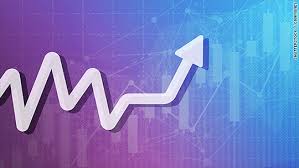Why the Stock Market Is Jumping After Its Worst Week in 2 Years

During its worst week in two years, the U.S. stock market, as measured by the Dow Jones Industrial Average and S&P 500, fell roughly 6%, as international equities sank 4%.
That selloff, prompted by fears of a trade war, has begun to show some reprieve. The Dow extended its relief rally from a day earlier, pushing up another 170 points Tuesday to 24,377, and the S&P 500 rising five points to 2,660.
True to form, President Donald Trump, who had largely remained quiet about the market rout, dubbed the rally “great news” on Twitter. The S&P 500, after all, did post its best day since 2015, climbing 2.7% as China offered to buy more U.S. semiconductors to lessen the trade surplus—a move markets considered as willingness to sidestep a full out trade war.
Notably, however, not only do both the Dow and S&P 500 remain below their levels from before Trump announced tariffs against China in mid-March, they still have yet to regain their 2018 wins.
J.P. Morgan equity strategist Dubravko Lakos-Bujas, meanwhile, sees it as a buying opportunity.
“The market appears to be overreacting to sequential negative narratives (e.g., inflation scare, rising yields, hawkish Fed, rising deficits), we believe strong macro and fundamentals will continue to prevail,” Lakos-Bujas wrote in a note to clients Tuesday, according to CNBC.
Some investors appeared to have done so, with Bank of America saying Monday that clients buying led to net inflows of about $ 3 billion.
Still, there are signs that mom-and-pop investors, at least, are growing wary of the market’s volatility. The March Conference Board survey of U.S. consumer sentiment revealed that 6% of these investors think the U.S. stock market will be higher in the next year. Notably, the survey came before Trump formally announced tariffs against China.
And looking even farther out, investors are also cautious about the bull market snapping. About 70% of institutional investors surveyed by Commonfund said they are “somewhat concerned” about a potential 20% correction in U.S. equities in the next 24 months. The fund surveyed 200 investors from endowments, foundations, and public pensions, also before Trump detailed the tariffs against the Middle Kingdom.
Either way, investors are expecting more difficult gains ahead in this aging bull market.
Catherine Keating, CEO of Commonfund, said, “We’ve learned over the years that Congress can change tax rates and the Federal Reserve can change interest rates, but that even together they can’t repeal the business cycle.”







